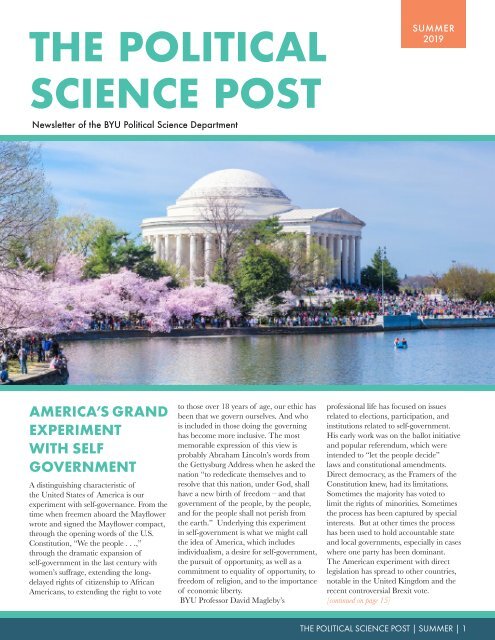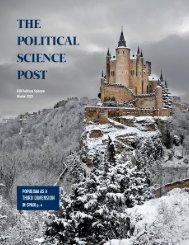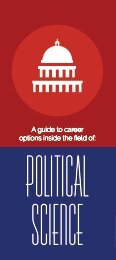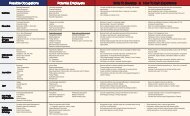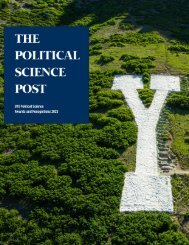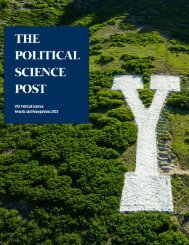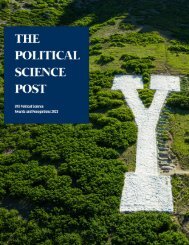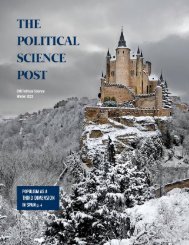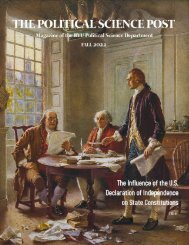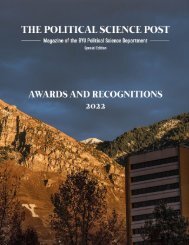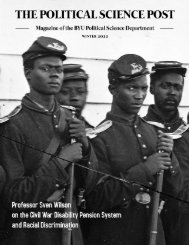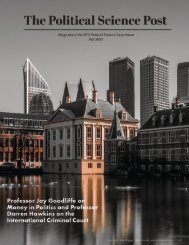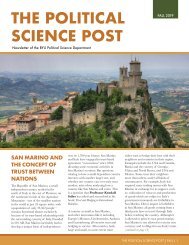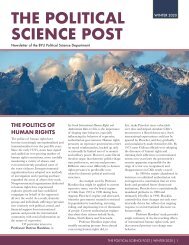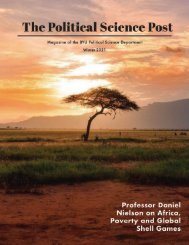You also want an ePaper? Increase the reach of your titles
YUMPU automatically turns print PDFs into web optimized ePapers that Google loves.
THE POLITICAL<br />
SUMMER<br />
<strong>2019</strong><br />
SCIENCE POST<br />
Newsletter of the BYU <strong>Political</strong> <strong>Science</strong> Department<br />
AMERICA’S GRAND<br />
EXPERIMENT<br />
WITH SELF<br />
GOVERNMENT<br />
A distinguishing characteristic of<br />
the United States of America is our<br />
experiment with self-governance. From the<br />
time when freemen aboard the Mayflower<br />
wrote and signed the Mayflower compact,<br />
through the opening words of the U.S.<br />
Constitution, “We the people . . .,”<br />
through the dramatic expansion of<br />
self-government in the last century with<br />
women’s suffrage, extending the longdelayed<br />
rights of citizenship to African<br />
Americans, to extending the right to vote<br />
to those over 18 years of age, our ethic has<br />
been that we govern ourselves. And who<br />
is included in those doing the governing<br />
has become more inclusive. The most<br />
memorable expression of this view is<br />
probably Abraham Lincoln’s words from<br />
the Gettysburg Address when he asked the<br />
nation “to rededicate themselves and to<br />
resolve that this nation, under God, shall<br />
have a new birth of freedom – and that<br />
government of the people, by the people,<br />
and for the people shall not perish from<br />
the earth.” Underlying this experiment<br />
in self-government is what we might call<br />
the idea of America, which includes<br />
individualism, a desire for self-government,<br />
the pursuit of opportunity, as well as a<br />
commitment to equality of opportunity, to<br />
freedom of religion, and to the importance<br />
of economic liberty.<br />
BYU Professor David Magleby’s<br />
professional life has focused on issues<br />
related to elections, participation, and<br />
institutions related to self-government.<br />
His early work was on the ballot initiative<br />
and popular referendum, which were<br />
intended to “let the people decide”<br />
laws and constitutional amendments.<br />
Direct democracy, as the Framers of the<br />
Constitution knew, had its limitations.<br />
Sometimes the majority has voted to<br />
limit the rights of minorities. Sometimes<br />
the process has been captured by special<br />
interests. But at other times the process<br />
has been used to hold accountable state<br />
and local governments, especially in cases<br />
where one party has been dominant.<br />
The American experiment with direct<br />
legislation has spread to other countries,<br />
notable in the United Kingdom and the<br />
recent controversial Brexit vote.<br />
[continued on page 15]<br />
THE POLITICAL SCIENCE POST | SUMMER | 1
TABLE OF CONTENTS<br />
3<br />
6<br />
15<br />
16<br />
EVENTS &<br />
PROGRAMS<br />
Read about the recent events on and<br />
off BYU campus.<br />
PEOPLE<br />
Spotlights on students, professors,<br />
and alumni alike. Hear more about<br />
professor publications.<br />
POLITICS<br />
Read more on America’s grand<br />
experiment with self government.<br />
ENGAGED<br />
LIVING<br />
Learn how to become more involved<br />
with the aims and mission behind<br />
BYU <strong>Political</strong> <strong>Science</strong>.<br />
The BYU Department of <strong>Political</strong><br />
<strong>Science</strong>, consistent with the aims of<br />
a BYU education, intends to foster<br />
“Lifelong Learning and Service.”<br />
We hope to provide our alumni<br />
with intelligent, thoughtful and<br />
sophisticated analysis of important<br />
issues, and to act as a catalyst<br />
for service in our communities,<br />
neighborhoods, nations and the world.<br />
Connect with us on social media<br />
@BYUPAS<br />
BYU POLITICAL AFFAIRS SOCIETY<br />
@BYUPAS<br />
@BYUPOLITICALSCI<br />
BYUPOLITICALSCIENCEBLOG.COM<br />
BYU POLI SCI STORIES @YOUTUBE<br />
THE POLITICAL SCIENCE POST | SUMMER <strong>2019</strong> | 2
EVENTS &<br />
PROGRAMS<br />
WOMEN WHO RUN ON NOVEMBER 28, 2018<br />
Representives Becky Edwards, Angela Romero, and Senator Luz Escamilla<br />
spoke to the BYU Womein in Politics chapter about how they ran for office on<br />
Wednesday, November 28th. They also gave advice on any future campaigns.<br />
CRUCIAL CONVERSATIONS: IMMIGRATION<br />
UNDER TRUMP ON DECEMBER 4, 2018<br />
The Civic Engagement Leadership Association hosted a forum called “Crucial<br />
Conversations: Immigration Under Trump” on Tuesday, December 4th.<br />
BYU TOCQUEVILLE SOCIETY ON DECEMBER 6,<br />
2018<br />
The BYU Tocqueville Society met Thursday, December 6, and discussed<br />
superhero movies and how it relates to the millennial identity.<br />
DURHAM LECTURE WITH SENATOR JEFFRY<br />
FLAKE ON JANUARY 24, <strong>2019</strong><br />
On Thursday, January 24th, Former United Sates Senator from Arizona Jeffry<br />
Flake presented the Durham Lecture. More info continued on page 5.<br />
UTAH STATE CAPITOL SPEED MENTORING<br />
EVENT ON JANUARY 31, 2018<br />
On January 31, <strong>2019</strong>, approximately 50 students and 20 mentors participated in the<br />
“Utah State Capitol Speed Mentoring Event.” The “Event” occurs on the afternoon<br />
and evening, wherein BYU <strong>Political</strong> <strong>Science</strong> students received career instructions<br />
from a panel of Utah government executives, they took a tour of the beautiful<br />
Capitol Building, and then, in a matter of an hour, from 4 to 5 PM, received<br />
mentoring advice from 20 different mentors in different offices of the State Capitol,<br />
from the Office of General Counsel, to the Public Relations office. The “Speed<br />
Mentoring Event” is always exciting and informative and we send a strong thank<br />
you to Mike Mower and his family for coordinating and executing this extraordinary<br />
experience. Thank you to all the mentors and executives who participating and<br />
offered their time and experience to our students.<br />
THE POLITICAL THE POLITICAL SCIENCE SCIENCE POST POST |SUMMER | SUMMER <strong>2019</strong> | 3
2ND ANNUAL POLITICAL SCIENCE STUDENT<br />
POSTER CONFERENCE<br />
Wednesday, December 12, 2018<br />
WINNERS FOR POLITICAL<br />
SCIENCE CONFERENCE<br />
Thank you to all who participated in the 2nd<br />
Annual <strong>Political</strong> <strong>Science</strong> <strong>Post</strong>er Conference on<br />
Wednesday, December 12, 2018 from noon<br />
to 3 PM! We had over 70+ posters and over a<br />
hundred student participants. Congratulations<br />
to the following award winners:<br />
First prize ($300):<br />
Chloe Roblyer and Shae Johnston, “Love of Nation:<br />
The Difference between Patriotism and<br />
Nationalism”<br />
Second prize ($200):<br />
Samantha Frazier and Connor Kreutz, “#MeToo:<br />
Analyzing Partisan Behavior in Response to<br />
Sexual Misconduct”<br />
Third prize ($100):<br />
Abbey Higham and Ashlyn Bodily, “Environmental<br />
Attitudes Decoded: How Moral Values<br />
Influence Conservative Environmentalism”<br />
Honorable mention (in alphabetical order by<br />
last name):<br />
Matthew Baldwin, “Mind the Gap: Unequal<br />
<strong>Political</strong> Participation on Social Media”<br />
Madeline Beck, “Don’t Talk to Strangers:<br />
Linguistic Diversity and Hostility Towards<br />
Refugees”<br />
Kelly Duncan, “Diverging Identities: How Latter-<br />
Day Saint Republican Caucus Participants<br />
in Utah have Shifted their Perspectives on<br />
Religion and Party”<br />
Matthew Easton, “The Democracy of Dating:<br />
A Look at Ideology and American Dating<br />
Preferences”<br />
Dani Hogan, “The Power of the Pen”<br />
THE POLITICAL SCIENCE POST | SUMMER <strong>2019</strong> | 4
SPEAKERS<br />
Durham Lecture: Former Senator Jeffry Flake<br />
Senator Jeffry Flake spoke on January 24, <strong>2019</strong>, for the Durham<br />
Lecture, on themes similar to those in his book: “The Conscience of<br />
a Conservative,” which is a rejection of the destructive politics and<br />
a return to principal. He said that everyone in Congress pledges to<br />
uphold the Constitution of the United States, and that they have a<br />
weekly prayer at the Senate. Each week a Senator is asked to talk about<br />
their faith journey at a special meeting and they select a song. Senator<br />
Flake chose: “I am a Child of God.” If we are going to maintain the<br />
vision of our forefathers, then we need to be unified, he said. “Assume<br />
the best, look for the good,” was posted on his refrigerator growing<br />
up, which was a gentle reminder from his mother to coax out the<br />
better angels in her children. Bickering and quarrelling is extensive<br />
in Washington. Vitriol and cruelty generally accompanies debate in<br />
Congress. Inter-party magnanimity is rarely found today, piling on<br />
is encouraged. Senator Flake has wanted to change this feeling in<br />
Congress. Hatred is unhealthy for the country as a whole.” We need<br />
to return to a healthy government with healthy parties. Understanding<br />
and compromise, shared values is essential.<br />
Thank you, Senator Flake, for your inspirational message.<br />
Watch here for the full speech.<br />
Public Affairs Lecture Series: Jen Christensen<br />
Public Affairs Lecture series on Thursday, March 28, at the<br />
Kennedy Center’s room, HRCB 238.<br />
Jen Christensen is a Utah-native, with deep roots in her<br />
community. She has owned a small business, chaired a charter<br />
school board, and worked on a congressional campaign. In<br />
the fields of business, government, and education she has<br />
development and management experience. After graduating<br />
from BYU with a degree in political science Jen worked in the<br />
Utah Lt. Governor’s Elections Office. She has experience in<br />
fundraising, event planning, and volunteer work. She’s organized<br />
large-scale humanitarian projects and small scale service projects<br />
closer to home. Jen is active in her church community, teaching,<br />
mentoring, and organizing for both youth and adults.<br />
Jen is the <strong>Political</strong> Director for Better Days 2020. She manages<br />
their legislative agenda and relationships with elected officials.<br />
She also serves as the Committee Chair for the Martha Hughes<br />
Cannon Statue Selection Committee. They have recently selected<br />
Utah artist Ben Hammond, for the commission and are eagerly<br />
anticipating the installment of the statue in August of 2020<br />
when the nation celebrates the 100th Anniversary of the 19th<br />
Amendment.<br />
An avid lover of the outdoors she’s crisscrossed Utah by jeep,<br />
by boat, on foot, and by bike. Traveling, seeing new places, and<br />
nature make her happy. It’s not uncommon to find her lost in a<br />
book or taking charge of the kitchen. Jen is raising three amazing<br />
daughters. They thrive on crepes, mostly-healthy home-cooked<br />
meals, family traditions, regular get-aways, and adventure.<br />
THE POLITICAL THE POLITICAL SCIENCE SCIENCE POST POST |SUMMER | FALL <strong>2019</strong> 2018 | 57
<strong>Political</strong> Philosopher<br />
HENRY DAVID<br />
THOREAU<br />
Henry David Thoreau (July 12, 1817 – May 6, 1862) was an American essayist, poet,<br />
philosopher, abolitionist, naturalist, development critic, surveyor, and historian, Thoreau<br />
graduated from Harvard College in 1837. A leading transcendentalist, Thoreau is best<br />
known for his book Walden, a reflection upon simple living in natural surroundings, and<br />
his essay “Civil Disobedience” (originally published as “Resistance to Civil Government”),<br />
an argument for disobedience to an unjust state.<br />
Thoreau’s books, articles, essays, journals, and poetry amount to more than 20 volumes.<br />
Among his lasting contributions are his writings on natural history, philosophical austerity,<br />
and Yankee attention to practical detail. He was also deeply interested in the idea of<br />
survival in the face of hostile elements, historical change, and natural decay; at the same<br />
time he advocated abandoning waste and illusion in order to discover life’s true essential<br />
needs.<br />
He was a lifelong abolitionist, delivering lectures that attacked the Fugitive Slave Law<br />
while praising the writings of Wendell Phillips and defending the abolitionist John Brown.<br />
Thoreau’s philosophy of civil disobedience later influenced the political thoughts and<br />
actions of such notable figures as Leo Tolstoy, Mahatma Gandhi, and Martin Luther King<br />
Jr. Resistance to Civil Government (Civil Disobedience) was first published in 1849. In it,<br />
Thoreau argues that individuals should not permit governments to overrule or atrophy<br />
their consciences, and that they have a duty to avoid allowing such acquiescence to enable<br />
the government to make them the agents of injustice. Thoreau was motivated in part by<br />
his distaste for slavery and the Mexican–American War (1846–1848).<br />
In 1848, Thoreau gave lectures at the<br />
Concord Lyceum entitled “The Rights<br />
and Duties of the Individual in relation to<br />
Government.” This formed the basis for<br />
his essay, which was first published under<br />
the title Resistance to Civil Government in<br />
an 1849 anthology by Elizabeth Peabody<br />
called Æsthetic Papers. The latter title<br />
distinguished Thoreau’s program from<br />
that of the “non-resistants” (anarchopacifists)<br />
who were expressing similar views.<br />
Resistance also served as part of Thoreau’s<br />
metaphor comparing the government to a<br />
machine: when the machine was producing<br />
injustice, it was the duty of conscientious<br />
citizens to be “a counter friction” (i.e., a<br />
resistance) “to stop the machine.”<br />
Walden Pond House<br />
The word civil has several definitions. The one that is intended in this case is “relating<br />
to citizens and their interrelations with one another or with the state”, and so civil<br />
disobedience means “disobedience to the state.” Sometimes people assume that civil in this<br />
case means “observing accepted social forms; polite” which would make civil disobedience<br />
something like polite, orderly disobedience. Although this is an acceptable dictionary<br />
definition of the word civil, it is not what is intended here. This misinterpretation is one<br />
reason the essay is sometimes considered to be an argument for pacifism or for exclusively<br />
nonviolent resistance. For instance, Mahatma Gandhi used this interpretation to suggest<br />
an equivalence between Thoreau’s civil disobedience and his own satyagraha.<br />
THE POLITICAL SCIENCE POST | SUMMER <strong>2019</strong>| 6
ALUMNI SPOTLIGHT<br />
Brent Taylor, 39, North Odgen City Mayor, an alumni of the BYU<br />
<strong>Political</strong> <strong>Science</strong> Department, died in Afghanistan on Saturday,<br />
November 3, 2018 on his fourth deployment. The Utah National<br />
Guard said in a statement Saturday that a service member died in an<br />
“insider attack” in Kabul on Nov. 3 apparently by one of those he was<br />
there to help. Initial reports indicated that the attacker was a member<br />
of the Afghan National Defense and Security Forces, the statement<br />
said.<br />
Senator Orrin Hatch wrote on the death of North Ogden Mayor<br />
Brent Taylor: “Brent was a hero, a patriot, a wonderful father, and<br />
a dear friend. News of his death in Afghanistan is devastating. My<br />
prayers and love are with Jennie and his 7 young children. His service<br />
will always be remembered.” Maj. Gen. Jefferson S. Burton, adjutant<br />
general of the Utah National Guard, confirmed that the person who<br />
opened fire on Taylor was killed immediately. Taylor is survived by<br />
his wife, Jennie, and their seven children who range in age from 11<br />
months to 13 years old.<br />
On May 23, <strong>2019</strong>, the Brigham Young University Army ROTC<br />
honored Major Brent Taylor’s life and legacy by adding his name to<br />
the Wilkinson Student Center Reflection Room’s Memorial Wall.<br />
The Memorial Wall is a tribute to BYU’s fallen soldiers and includes<br />
the names of BYU veterans (students and alumni) who have sacrificed<br />
their lives serving their country, from World War I to more current<br />
conflicts. Taylor’s name will join 210 other names on the Memorial<br />
Wall.<br />
Brent and Jennie Taylor Family Endowed Scholarship<br />
Additionally, the Taylor family announced the new Brent and Jennie<br />
Family Endowed Scholarship, awarded each year to an undergraduate<br />
political science student at BYU.<br />
“Nearly two decades ago, Brent and I entered this campus with a<br />
determination to learn, and we have since gone forth with a lifelong<br />
commitment to serve,” said Jennie Taylor. “Please join me, my seven<br />
young children and the rest of our family in helping future students<br />
of political science carry on Brent’s legacy of sacrifice, statesmanship<br />
and service-centered leadership.” If you would like to contribute<br />
to the Taylor Family Endowed Scholarship, please contact http://<br />
majorbrenttaylor.com/<br />
BRENT<br />
TAYLOR<br />
In Memorium<br />
Former North Odgen<br />
City Mayor<br />
THE THE POLITICAL SCIENCE POST | | SUMMER <strong>2019</strong>| | 7
ALUMNI SPOTLIGHT<br />
In October of 2018, David B. Barlow, former U.S. Attorney for the<br />
District of Utah (2011-14), joined the Firm of Dorsey & Whitney<br />
LLP as a Partner in its Trial Group and Government Enforcement &<br />
Corporate Investigations Practice Group in Salt Lake City. He also<br />
works regularly from Dorsey’s Washington, D.C., office.<br />
Mr. Barlow’s practice focuses on government and internal corporate<br />
investigations as well as business litigation, with particular emphasis<br />
on pharmaceutical, medical device and mass tort matters. He joins<br />
Dorsey from Walmart, where he served as Vice President, Compliance<br />
for Walmart’s $40-billion Health and Wellness business, including more<br />
than 8,000 pharmacies, vision centers and medical clinics throughout<br />
the United States. Before joining Walmart, he was a partner in Sidley<br />
Austin LLP for more than a decade, where he handled government<br />
and internal investigations across the United States, Europe and Asia,<br />
represented clients in both civil and criminal matters in state and federal<br />
courts and litigated a wide range of cases.<br />
He was nominated by President Barack Obama and unanimously<br />
confirmed by the Senate as U.S. Attorney for the District of Utah in<br />
September 2011. Immediately prior to his service as U.S. Attorney, he<br />
served from 2010 to 2011 as Senator Mike Lee’s Chief Counsel on the<br />
Senate Judiciary Committee.<br />
In his role as U.S. Attorney from 2011 to 2014, Mr. Barlow led an<br />
office of approximately 85 personnel, including 40 Assistant U.S.<br />
Attorneys who represented the United States in criminal prosecutions<br />
and civil litigation. During his tenure, the office conducted thousands<br />
of investigations and prosecutions together with the FBI, IRS, Secret<br />
Service, DEA, ATF and many other federal, state and local law<br />
enforcement agencies. He personally participated in investigations,<br />
Grand Jury indictments, plea negotiations and criminal trials during his<br />
service as U.S. Attorney. He also served on the DOJ’s national White<br />
Collar Crime Subcommittee and Healthcare Fraud Working Group<br />
and chaired the Local Government Coordination Working Group. Mr.<br />
Barlow also was asked to serve on the Attorney General’s Advisory<br />
Committee, the leadership team of U.S. Attorneys across the country,<br />
where he represented other U.S. Attorneys in the 10th Circuit and<br />
advised on DOJ policy, management and operational issues.<br />
DAVID<br />
BARLOW<br />
B.A Poltical <strong>Science</strong> at<br />
Brigham Young University<br />
J.D. from Yale Law School<br />
Mr. Barlow has a B.A. degree summa cum laude from Brigham Young<br />
University and a J.D. degree from Yale Law School.<br />
THE THE POLITICAL SCIENCE POST | | SUMMER <strong>2019</strong>| | 7<br />
8
STUDENT<br />
SPOTLIGHTS<br />
KELLY DUNCAN<br />
Graduated April <strong>2019</strong> and about to go on<br />
to work at Y2 Analytics.<br />
Kelly Duncan is from Salt Lake City, Utah and graduated BYU studying<br />
<strong>Political</strong> <strong>Science</strong> with an emphasis in Research and Analysis and minors in<br />
Spanish and Communications. Kelly has loved being involved within the<br />
department in her roles as a Research Assistant and as the <strong>Political</strong> Affairs<br />
Society Vice President this past school year. Kelly has also been involved<br />
within BYU’s Center for the Study of Elections and Democracy (CSED) as<br />
a Research Fellow where she works closely with faculty and other students<br />
in researching the latest political science data and practicing new research<br />
methods. Kelly has a passion for econometrics and recognizes that statistics<br />
can be powerful and multilayered when used in political discourse. For that<br />
reason, Kelly spent most of 2018 as an intern managing the voter database for<br />
the Romney for Utah campaign and after graduation she will be working for<br />
a market research firm called Y2 Analytics. Eventually, Kelly plans to earn a<br />
Master’s degree in Data <strong>Science</strong> or Applied Statistics where she hopes to help<br />
shape policy that will positively influence people’s lives.<br />
SAMANTHA FRAZIER<br />
Graduated April <strong>2019</strong> and about to go on<br />
to work at McKinsey in Los Angeles.<br />
Samantha Frazier is from Highland, Utah and just graduated BYU studying<br />
<strong>Political</strong> <strong>Science</strong> and Communications. She spent the summer and fall of her<br />
sophomore year at Hillary Clinton’s campaign headquarters in New York City<br />
working as a Press Advance assistant, traveling with the campaign to press<br />
events, media interviews, and campaign rallies around the East Coast. Last<br />
summer, Samantha worked on the Corporate Services and Real Estate team at<br />
Goldman Sachs’s New York office. A highlight of this experience was assisting<br />
with the company’s global environmental and social governance efforts, which<br />
allowed Samantha to combine her passion for policy and environmentalism<br />
with corporate social responsibility. On campus, Samantha has been involved<br />
with a variety of student organizations such as BYU Women in Politics and<br />
BYU College Democrats, where she served as President for a year. After<br />
graduation, Samantha will be heading to work as a consultant at McKinsey<br />
& Company’s Southern California office, where she hopes to focus on solving<br />
problems in the public and social sectors. In her free time, you can usually<br />
find Samantha running, listening to show tunes, or coming up with absurd<br />
conspiracy theories about her favorite reality television shows.<br />
THE POLITICAL THE POLITICAL SCIENCE SCIENCE POST POST |SUMMER | FALL <strong>2019</strong> 2018 | 97
STUDENT<br />
SPOTLIGHTS<br />
MATT EASTON<br />
Graduated April <strong>2019</strong> as our Valedictorian<br />
Matthew Jeffery Easton¸ a <strong>Political</strong> <strong>Science</strong> graduate, is the son of Jeff and<br />
Liz Easton and the third of four children. He grew up in Cottonwood<br />
Heights, Utah and served a mission in Sydney, Australia speaking Korean.<br />
While at BYU, Matt has worked as a teaching and research assistant in<br />
the department, which included conducting public policy research in New<br />
Delhi, India. He spent last summer interning at the United Nations in<br />
Switzerland, where he developed a strong passion for human rights and<br />
equality. He is currently co-authoring original research on dating behavior<br />
and partisanship with Dr. John Holbein and is a research fellow with the<br />
Center for the Study of Elections and Democracy. Matt has served as<br />
the President of the BYU <strong>Political</strong> Affairs Society, Primary Editor for the<br />
undergraduate journal Sigma, and Advertising Chair with Students for<br />
International Development. In his spare time, Matt enjoys skiing, facial<br />
care, and eating popcorn. He is incredibly grateful to his family, friends,<br />
and mentors for giving him confidence to achieve his goals. Matt would<br />
also like to thank the deer that hit him on campus his freshman year, as it<br />
gave him the fire to persevere.<br />
RACHEL FINLAYSON<br />
Graduated April <strong>2019</strong>, Salutatorian, and is going to<br />
work at McKinsey & Company in San Francisco<br />
Rachel Finlayson graduated as one of <strong>Political</strong> <strong>Science</strong>’s salutatorians in<br />
August of <strong>2019</strong>. Senior year was an incredible and fulfilling experience;<br />
Rachel was a national finalist for the <strong>2019</strong> Rhodes Scholarship, served<br />
as Editor-in-chief of Sigma (BYU’s journal of politics and international<br />
studies), embarked on road trips to LA and Santa Fe, and tried her<br />
hand at ice hockey. She will spend the summer months studying abroad<br />
in the Baltic States and London, examining Nazi and Soviet influence<br />
on national identity as well as British history, politics, and literature. In<br />
the fall, she will depart for McKinsey & Company in the Bay area as a<br />
business analyst, where she plans to specialize in public and social sector<br />
work. She hopes to make her way back to school in the coming years to<br />
pursue graduate studies in law, ethics, and foreign policy.<br />
THE THE POLITICAL THE POLITICAL SCIENCE SCIENCE POST POST |SUMMER POST | FALL <strong>2019</strong> <strong>2019</strong> 2018 | | 10 97
FACULTY SPOTLIGHT<br />
David Blyth Magleby (born October 20, 1949) is a distinguished professor of<br />
political science at Brigham Young University (BYU) and formerly the dean<br />
of the College of Family, Home, and Social <strong>Science</strong>s. He is an expert on<br />
direct democracy and campaign finance.<br />
David grew up in Salt Lake City and his AP High School teacher Garn<br />
Coombs helped give him his academic focus. In 1968, David won a national<br />
scholarship which took him to Washington, DC as a high school student,<br />
and while there he went through a receiving line at the White House where<br />
he shook hands with President Lyndon B. Johnson. President Johnson asked<br />
him where he was from, and David told him Utah. Then President Johnson<br />
said: “Well, I speak to your Prophet from time to time.” In the summer of<br />
1968, David also went to the Democratic National Convention, shortly after<br />
the assassination of Robert F. Kennedy, which had been the night of his<br />
high school graduation. There were riots in Chicago, where the Convention<br />
occurred, and they were bussed into and out of the Convention Center.<br />
PROFESSOR<br />
DAVID<br />
MAGLEBY<br />
B.A. in <strong>Political</strong> <strong>Science</strong> at<br />
the University of Utah and<br />
his M.A. and Ph.D. from the<br />
University of California,<br />
Berkeley<br />
He and his high school debate partner stayed at the YMCA in downtown<br />
Chicago, a block from the headquarters for the Humphrey Campaign in<br />
the Conrad Hilton Hotel. David and his friend provided reports from the<br />
convention for the Deseret News. When he called his parents the second<br />
night of the convention, they were concerned about his safety. He persuaded<br />
them he would be ok. While chaotic, the experience reinforced his interest in<br />
studying elections and democracy.<br />
After coming to BYU as a professor, Magleby was named a Congressional<br />
Fellow of the American <strong>Political</strong> <strong>Science</strong> Association. This distinction meant<br />
he worked for a year with the U.S. Senate Majority Leader, Robert C. Byrd.<br />
During that year Magleby provided staff support for the leader, focusing<br />
primarily on legislation to reform campaign finance.<br />
Magleby is the author of several books. His first, Direct Legislation, is<br />
considered the seminal work on initiatives and referenda. Along with<br />
the other works Magleby has written, he is the lead editor of a series on<br />
presidential election finance, including Financing the 2016 Election. He<br />
has also written several works on issues related to soft money in campaigns.<br />
In 1990, he served on a bipartisan Senate task force on campaign finance<br />
reform and his book on the subject, The Money Chase, was published by<br />
the Brookings Institution.[2] In addition, Magleby authors a best-selling<br />
American government textbook, Government by the People, which, as of<br />
early <strong>2019</strong>, was in its 28th edition.<br />
Prior to joining the faculty of BYU, Magleby was a professor at the<br />
University of California, Santa Cruz and the University of Virginia.<br />
Magleby received his bachelor’s degree from the University of Utah and his<br />
M.A. and Ph.D. from the University of California, Berkeley.<br />
THE POLITICAL THE POLITICAL SCIENCE SCIENCE POST | POST |SUMMER | FALL <strong>2019</strong> 2018 | 11 97
FACULTY SPOTLIGHT<br />
Lisa grew up in Idaho Falls and maintains a deep love of potatoes.<br />
Lisa’s love of political science began in high school when she went<br />
to Idaho “Girl’s State,” sponsored by the American Legion where<br />
she participated in a mock government. There, she was elected the<br />
“governor” at the end of a weeklong event with about 100 girls. She<br />
also won a speech competition for the Union Pacific railroad and<br />
at the award dinner, sat with Democratic Governor of Idaho Cecil<br />
Andrus. He told her he won so many terms as Governor “because he<br />
picked his competition,” an idea that Lisa wanted to understand. She<br />
feels Andrus tried to get the Republican opponenet to be weak so he<br />
would gain more votes.<br />
She studied at BYU and majored in <strong>Political</strong> <strong>Science</strong> with a minor<br />
in Latin American Studies. She met her husband in Dan Neilsen’s<br />
Poli 200 when they were freshmen. Both were frantically trying to<br />
finish a term paper and swapped and edited each other’s papers.<br />
They continue to swap their scholarly papers today. She finished her<br />
bachelors in 3 years and worked with Chris Karpowitz, Quin Monson,<br />
and Kelly Patterson developing a love of research and statistics. As a<br />
Utah State Legislative intern working with Jim Dunnigan, she worked<br />
on health care issues before Obamacare. She and her husband both<br />
applied to graduate school and attended UC Santa Barbara, with a<br />
beautiful campus on the beach.<br />
They had fun but worked hard. Their two children wer both born<br />
in Santa Barbara, a boy and a girl. They enjoyed many barbedcues<br />
on the beach. Her favorite thing to barbecue: pineapple. They lived<br />
on campus and she graduated in 2016 and he in 2014. Then she<br />
worked and moved to DC in 2014 as a post doc with Tali Mendelberg<br />
at Princeton. They spent four years in DC and she continued her<br />
love of research. She began working at BYU in 2018 and loves<br />
teaching a class on Race, Ethnicity and Gender in American politics.<br />
She is currently working on a study of “<strong>Political</strong> Conversations” to<br />
understand how people talk about politics in everyday living. Lisa loves<br />
to play games in her free time, even though her husband usually wins.<br />
Her current favorites are Pinochle and Azul.<br />
LISA ARGYLE,<br />
ASSISTANT<br />
PROFESSOR<br />
B.A in <strong>Political</strong> <strong>Science</strong> at<br />
Brigham Young University<br />
and Ph.D from UC Santa<br />
Barbara<br />
THE POLITICAL SCIENCE POST | SUMMER <strong>2019</strong>| | 12<br />
78
FACULTY PUBLICATIONS<br />
Government by the People, 2016 Presidential Election, 26th Edition<br />
COWRITTEN BY DAVID MAGLEBY, PAUL LIGHT, AND CHRISTINE NEMACHECK<br />
Government by the People, 2016 Presidential Election, 26th Edition, provides a thorough,<br />
Constitution-based introduction to the foundational principles, processes, and institutions<br />
of American government. Throughout, authors David Magleby, Paul Light, and Christine<br />
Nemacheck highlight the central role that people play in a constitutional democracy, inspiring<br />
students to see how similarities and differences in political beliefs continue to shape government to<br />
this day. The 2016 Presidential Election Edition includes coverage of the major issues in today’s<br />
headlines to engage students in learning, as well as to boost the relevance of course material to<br />
students’ lives.<br />
Financing the 2016 Election<br />
BY DAVID MAGLEBY<br />
Beginning with the 1960 election, readers could turn to one book for an authoritative and<br />
comprehensive examination of campaign finance at the federal level. Now, the latest in this<br />
respected series, Financing the 2016 Election, explores the role of money in one of the most<br />
unconventional elections in modern American history. A team of leading scholars has dug into the<br />
roles played by political parties and special interest groups (including their “Super PACS”) in the<br />
presidential and congressional elections of 2016.<br />
David Magleby and his team of experts examined Federal Elections Commission reports and<br />
interviewed dozens of key participants, including representatives of virtually all the major interest<br />
groups active in the 2016 election cycle. They place that election in the context of how U.S.<br />
elections have been financed during recent decades—a context that illustrates how dramatically<br />
different campaign finance is today from the past. Among the most important changes has been<br />
the growth of so-called Super PACS, which have become increasingly important both in the<br />
financing they provide candidates and in their ability to act independently, both for and against<br />
candidates. Overall, Super PACS doubled their spending in 2016 from four years earlier.<br />
Taking a comprehensive approach, this book helps readers understand how the financing of<br />
elections—including the increasing reliance by candidates on outside special interest groups—<br />
ultimately affects politics and public policy.<br />
Trust and Hedging in International Relations<br />
BY KENDALL STILES<br />
Do states trust each other? What are the political and ethical implications of trust? Drawing from<br />
a wide range of disciplines, Trust and Hedging in International Relations adds to the emerging<br />
literature on trust in international relations by offering a systematic measure of state-to-state trust.<br />
Looking at how relationships between European microstates and their partners have evolved over<br />
the past few centuries, Stiles finds that rather than trusting, most microstates are careful to hedge<br />
in their relations by agreeing only to arrangements that provide them with opt-out clauses, heavy<br />
involvement in joint decision-making, and sunset provisions. In the process, Stiles assesses the role<br />
of rationality, social relations, identity politics, and other theories of trust to demonstrate that trust<br />
is neither essential for cooperation nor a guarantee of protection and safety. Finally, he explores<br />
the ethical implications of a foreign policy founded on trust—in particular whether heads of state<br />
have the right to enter into open-ended agreements that put their citizens at risk.<br />
THE POLITICAL SCIENCE POST | SUMMER <strong>2019</strong> | 13<br />
THE POLITICAL SCIENCE POST | SUMMER <strong>2019</strong>| 13
FACULTY IN THE NEWS<br />
Julie Rose’s Top of Mind<br />
JANUARY 22, <strong>2019</strong><br />
The shutdown has now lasted a full month. The<br />
Republican-controlled Senate is expected to<br />
vote this week on a proposal President Trump<br />
announced over the weekend to offer temporary<br />
protection to undocumented immigrants brought<br />
to the country illegally as children. That would<br />
be in exchange for funding Trump’s $5.7 billion<br />
request for a border wall. But the bill is unlikely<br />
to pass because Democrats in both the Senate<br />
and House say they will not negotiate until the<br />
government is reopened.<br />
Here’s the link to the interview:<br />
http://tiny.cc/nqtb8y<br />
JANUARY 24, <strong>2019</strong><br />
Former Republican Senator Jeffry Flake guest<br />
starred on Julie Rose’s Top of Mind. “With the<br />
longest government shutdown in US history<br />
dragging on, recently retired Arizona Sen. Jeff<br />
Flake visits Top of Mind to discuss what has gone<br />
wrong with our political discourse and whether<br />
his public criticism of President Trump achieved<br />
what he’d hoped.”<br />
Here’s the link to the interview:<br />
http://tiny.cc/motb8y<br />
MARCH 20, <strong>2019</strong><br />
British Prime Minister Theresa May has asked the<br />
European Union to delay the UK’s exit until June<br />
30 so she has some more time to try and find a<br />
Brexit deal her own parliament can agree to. As<br />
it stands, the divorce will happen next Friday at<br />
midnight. The European Commission will meet<br />
Thursday to consider whether to agree to the<br />
request for a Brexit delay.<br />
Here’s the link to the interview:<br />
http://tiny.cc/lntb8y<br />
THE POLITICAL SCIENCE POST | SUMMER <strong>2019</strong> | 14
AMERICA’S GRAND EXPERIMENT<br />
WITH SELF GOVERNMENT<br />
[continued from page 1]<br />
Magleby participated years before Brexit<br />
as an Oxford University Fulbright Scholar<br />
in discussions and drafts of proposed rules<br />
for national referendums in the UK.<br />
A second major emphasis of Magleby’<br />
s scholarship has been partisanship,<br />
especially regarding the Independent<br />
voter. In a journal article and later a<br />
book, Magleby and a group of graduate<br />
school classmates and their professor<br />
demonstrated that most self-classified<br />
Independents vote like partisans and share<br />
the same ideological views. This widely<br />
cited book, The Myth of the Independent<br />
Voter, will form a primary focus of a<br />
conference being held at BYU in early<br />
June on partisanship. Several prominent<br />
scholars from across the country will<br />
present papers, including Magleby and<br />
his graduate school classmate, Candice<br />
Nelson.<br />
How America finances election campaigns<br />
has been a third emphasis of Magleby’ s<br />
research. He is widely recognized as an<br />
authority on the topic, having edited a<br />
dozen books on the subject. The question<br />
of who donates is also the topic of a<br />
new book Magleby has published with<br />
Professor Jay Goodliffe of the <strong>Political</strong><br />
<strong>Science</strong> department and Joseph Olsen,<br />
Assistant Dean in the College of Family,<br />
Home, and Social <strong>Science</strong>s. The Book<br />
Who Donates: The Importance of<br />
Message, Messenger, Medium, and<br />
Structure has broken new ground in its<br />
thorough examination of small donors,<br />
new donors, and the role of the Internet in<br />
fundraising to begin explaining why people<br />
participate in this way.<br />
A central theme of Magleby’ s teaching<br />
has been self-government. In his final<br />
lecture to POLI 110 last December, he<br />
emphasized that the structure of American<br />
government protects liberty and limits the<br />
impact of passion and hatred. It does this<br />
through separation of powers, checks and<br />
balances, protections given to civil liberties<br />
and civil rights, and federalism. Also<br />
important are a free press, political parties,<br />
and free elections. Magleby taught that<br />
each citizen’s responsibility is to sustain<br />
our experiment with self-government.<br />
How do busy people do this throughout<br />
their adult lives? He shared a formula:<br />
knowledge + participation = power or<br />
impact<br />
He recommended that students specialize<br />
in an area important to them, like<br />
education, the environment, agriculture,<br />
health care. As specialists in these areas,<br />
they can converse with others who know<br />
the topic. The second part of the equation<br />
is to participate. Knowledge without<br />
participation will matter very little, and<br />
participation without knowledge will<br />
not be accepted by decision makers and<br />
the public. If, however, you combine<br />
knowledge and participation, you have<br />
power and the ability to have an impact.<br />
THE POLITICAL SCIENCE POST | SUMMER <strong>2019</strong> | 15
ENGAGED<br />
LIVING<br />
Serving our communities<br />
and country can bring<br />
fulfillment and can easily be<br />
part of a well-rounded life.<br />
Take advantage of the local<br />
and national opportunities<br />
to serve. Local BYU <strong>Political</strong><br />
<strong>Science</strong> Alumni Chapters,<br />
such as those in New York<br />
City, Washington, DC, and<br />
in the Bay Area can help<br />
assist in the desire<br />
to serve.<br />
FACULTY QUOTE<br />
The Spirit, or Light of Christ, is given to everyone to provide<br />
guidance and encouragement in those important domains of<br />
moral action where reason and experience are demonstrably<br />
inadequate guides. It is a simple fact of modern philosophy that<br />
reason has not even come close to providing anyone with a single<br />
true and persuasive set of moral principles. Even if we had such<br />
a complete set of moral guidelines, our reasoning abilities would<br />
not be adequate to use them in particular situations to always<br />
know what we should do. We are therefore all in need of an<br />
omniscient friend who knows what courses of action will have the<br />
best implications for the future. As this friend gives us spiritual<br />
guidance and tells us what is right, we will come to rely on it if<br />
we are honest in heart and as we recognize the reliability of that<br />
guidance. Thus, by being rigorously honest in pursuing what is<br />
right and true, even when it requires sacrifice on our part, we can<br />
come to have faith—to act as Christ directs.<br />
-Noel B. Reynolds<br />
Professor Reynolds is an emeritus professor of political science at Brigham Young University (BYU), where he has also served as<br />
an associate academic vice president and as director for the Foundation for Ancient Research and Mormon Studies (FARMS).<br />
He was a member of the BYU faculty from 1971 to 2011. He has also written widely on the theology of The Church of Jesus<br />
Christ of Latter-day Saints. Reynolds was born in Los Angeles, California. He grew up near Cody, Wyoming where his father<br />
had received a homestead in 1948. Reynolds served an LDS Church mission in Uruguay, Argentina, and Paraguay from 1961<br />
to 1964. Reynolds earned a bachelor’s degree at BYU, followed by M.A. and Ph.D. degrees from Harvard University. He has<br />
been a visiting professor at Harvard Law School, Edinburgh University and Hebrew University of Jerusalem. In the 1970s,<br />
Reynolds was chair of BYU’s department of philosophy. He also coedited Religious Liberty in Western Thought with Cole<br />
Durham Jr. Reynolds was one of the editors of the Encyclopedia of Mormonism, published in 1992 by Macmillan. Reynolds<br />
is married to the former Sydney Sharon Smith (now Sydney S. Reynolds). She was a member of the LDS Church’s Primary<br />
General Presidency from 1999 to 2005. They are the parents of eleven children.<br />
THE POLITICAL SCIENCE POST | SUMMER <strong>2019</strong> | 16


